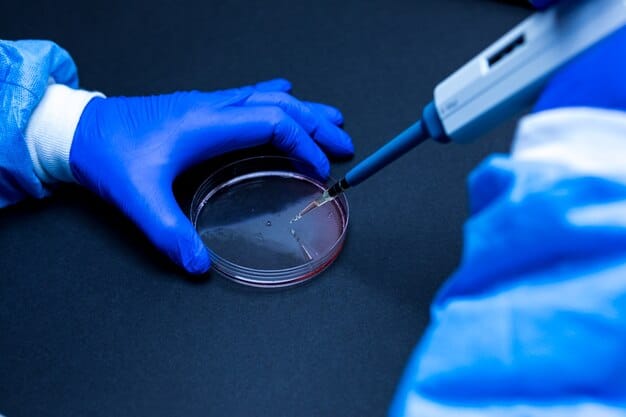New FDA-Approved Male Fertility Products: What’s New?

As of today, there have been no new male fertility products approved by the FDA in the last three months; however, several ongoing clinical trials and existing treatments continue to offer hope and options for men facing fertility challenges.
Are you trying to start a family and facing male fertility issues? It’s natural to wonder, Are There Any New Male Fertility Products Approved by the FDA in the Last 3 Months? Let’s explore the latest developments in male fertility treatments, shedding light on what’s available and what’s on the horizon.
Understanding Male Fertility Challenges
Male fertility challenges are more common than many people realize. Several factors can affect a man’s ability to conceive, from lifestyle choices to underlying health conditions. Understanding these challenges is the first step towards finding effective solutions.
Common Causes of Male Infertility
Male infertility can stem from a variety of issues. Here are some common causes:
- Sperm Production Problems: Issues with the quantity or quality of sperm.
- Hormonal Imbalances: Irregular hormone levels affecting sperm production.
- Structural Issues: Blockages or abnormalities in the reproductive system.
- Lifestyle Factors: Smoking, excessive alcohol consumption, and obesity can impact fertility.
Identifying the specific cause is crucial for determining the most appropriate treatment.
The Role of the FDA in Approving Fertility Products
The FDA plays a critical role in ensuring that any product marketed for medical use is safe and effective. This includes male fertility products. The FDA’s approval process involves rigorous testing and evaluation to protect consumers.
Understanding the regulatory landscape can help you make informed decisions about your treatment options.

Current FDA-Approved Treatments for Male Infertility
While new approvals may be limited, several existing treatments have been approved by the FDA and are currently used to address male fertility issues. These treatments range from medications that boost sperm production to surgical procedures that correct structural problems.
Medications for Hormone Imbalances
Hormone imbalances can significantly affect sperm production. Several medications are approved to address these imbalances:
- Clomiphene Citrate (Clomid): Used to stimulate the production of testosterone and sperm.
- Human Chorionic Gonadotropin (hCG): Can help increase testosterone levels and sperm count.
- Aromatase Inhibitors: Used to balance estrogen levels, which can positively impact sperm production.
These medications can help restore hormonal balance and improve sperm production.
Surgical Procedures for Structural Issues
In some cases, structural issues in the reproductive system may contribute to infertility. Surgical procedures can help correct these problems:
- Varicocelectomy: Surgical repair of varicoceles, enlarged veins in the scrotum that can affect sperm production.
- Vasectomy Reversal: Reconnecting the vas deferens after a vasectomy to restore fertility.
- Transurethral Resection of the Ejaculatory Ducts (TURED): Clearing blockages in the ejaculatory ducts to improve sperm flow.
Surgical interventions can address physical impediments to fertility.
Exploring the Male Fertility Product Pipeline
The field of male fertility is constantly evolving, with researchers working to develop new and innovative treatments. While there may not be any recent FDA approvals in the last three months, it’s important to be aware of the products currently in the pipeline.
Investigational Drugs and Therapies
Several investigational drugs and therapies are being studied to address various aspects of male infertility. These include:
- Novel Hormonal Treatments: Drugs that target specific hormonal pathways to improve sperm production and function.
- Antioxidant Therapies: Treatments that reduce oxidative stress, which can damage sperm.
- Gene Therapies: Experimental approaches aimed at correcting genetic defects that cause infertility.
These treatments are in various stages of clinical trials, and their potential benefits are being closely evaluated.
Clinical Trials and Research Studies
Clinical trials play a crucial role in the development of new fertility treatments. These studies evaluate the safety and effectiveness of investigational products. Men who are interested in participating in clinical trials may have access to cutting-edge treatments before they become widely available.
Staying informed about clinical trials can provide hope and options for those struggling with infertility.
Lifestyle Changes to Support Male Fertility
In addition to medical treatments, lifestyle changes can significantly impact male fertility. Adopting healthy habits can improve sperm quality and overall reproductive health. These changes are often recommended in conjunction with medical interventions.
Diet and Nutrition
A healthy diet rich in essential nutrients can support sperm production and function. Focus on:
- Antioxidants: Foods rich in antioxidants, such as fruits and vegetables, can protect sperm from damage.
- Zinc and Selenium: These minerals are essential for sperm production and motility.
- Omega-3 Fatty Acids: Found in fish and flaxseed, omega-3 fatty acids can improve sperm quality.
Making dietary changes can have a positive impact on fertility.
Exercise and Weight Management
Regular exercise and maintaining a healthy weight can also improve male fertility. Aim for:
- Moderate Exercise: Regular physical activity can boost testosterone levels and improve sperm quality.
- Weight Management: Obesity can negatively impact hormone levels and sperm production.
- Avoiding Overheating: Activities that cause overheating, such as hot tubs and saunas, should be avoided.
Adopting a healthy lifestyle can complement medical treatments and enhance fertility.

Navigating Male Fertility Treatments with Your Doctor
When exploring male fertility treatments, it’s essential to work closely with your doctor. They can help you determine the underlying cause of your infertility and recommend the most appropriate treatment options. A collaborative approach ensures you receive personalized care.
The Importance of Medical Evaluation
A comprehensive medical evaluation is the first step in addressing male infertility. This typically includes:
- Semen Analysis: Evaluating the quantity, quality, and motility of sperm.
- Hormone Testing: Assessing hormone levels to identify any imbalances.
- Physical Examination: Checking for any structural issues or abnormalities.
A thorough evaluation provides valuable information for developing a treatment plan.
Choosing the Right Treatment Option
The best treatment option depends on the specific cause of your infertility and your individual circumstances. Your doctor can help you weigh the pros and cons of different treatments and make an informed decision. Factors to consider include:
- Effectiveness: How likely is the treatment to improve fertility?
- Side Effects: What are the potential side effects of the treatment?
- Cost: How much does the treatment cost, and is it covered by insurance?
Informed decision-making is crucial for successful fertility treatment.
Future Directions in Male Fertility Research
The future of male fertility treatment is promising, with ongoing research exploring new and innovative approaches. These advancements offer hope for men who have not found success with existing treatments. Staying informed about the latest developments can help you stay optimistic about your fertility journey.
Emerging Technologies and Therapies
Several emerging technologies and therapies are showing promise in the field of male fertility:
- Artificial Intelligence (AI): AI is being used to analyze sperm samples and predict fertility outcomes.
- Microfluidic Devices: These devices can sort sperm based on motility and other characteristics, improving the chances of fertilization.
- Stem Cell Therapies: Stem cells are being explored as a potential treatment for severe cases of infertility.
These advancements could revolutionize the way male infertility is treated.
The Role of Personalized Medicine
Personalized medicine is gaining traction in the field of male fertility. This approach involves tailoring treatments to the individual based on their unique genetic and physiological characteristics. By understanding the specific factors that contribute to a man’s infertility, doctors can provide more targeted and effective treatments.
Personalized medicine holds the key to unlocking new and successful fertility solutions.
| Key Point | Brief Description |
|---|---|
| 🔬 Semen Analysis | Evaluates sperm quantity, quality, and motility. |
| 💊 Medications | Hormone treatments like Clomid can improve sperm production. |
| 🏋️ Lifestyle | Diet, exercise, and weight management are crucial for fertility. |
| 🧬 Research | Ongoing studies explore innovative fertility therapies. |
Frequently Asked Questions (FAQ)
▼
The first step is to consult with a healthcare professional specializing in male fertility. They can conduct a thorough medical evaluation, including semen analysis and hormone testing, to determine the underlying cause of any potential issues.
▼
Lifestyle choices have a significant impact on male fertility. Factors such as diet, exercise, weight management, and avoiding harmful substances like tobacco and excessive alcohol can all contribute to improved sperm quality and overall reproductive health.
▼
Several medications are used to treat male infertility, depending on the underlying cause. Common options include Clomiphene Citrate (Clomid) to stimulate hormone production, and antibiotics to address infections that may affect sperm quality.
▼
Yes, surgical options are available for certain causes of male infertility. Varicocelectomy, the surgical repair of varicoceles, is one such option. Vasectomy reversal is another surgical procedure that can restore fertility after a vasectomy.
▼
For male fertility issues, you should consult a urologist specializing in male reproductive health or an andrologist. These specialists have expertise in diagnosing and treating conditions that affect male fertility and reproductive function.
Conclusion
While there haven’t been any new FDA-approved male fertility products in the last three months, several established treatments and ongoing research efforts continue to offer hope for men facing fertility challenges. By staying informed and working closely with healthcare professionals, individuals can explore the best options for their specific needs and circumstances.





